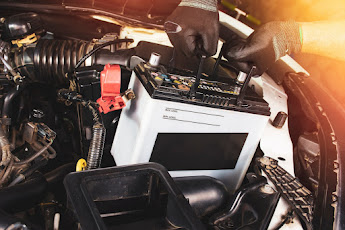The classic and lovely Toyota RAV4 it’s reliable with amazing safety features and even better mileage, cargo space, and of course updated tech. Now if you’re looking at getting this SUV or already have one, you’ll need to know all about your tires. Our Toyota of Orlando experts are breaking down everything you need to know, from the tire size to tire pressure.
Toyota RAV4 Tire Pressure: What Is It and How to Check It!
Before we get into the nitty-gritty, you’ll need to know the Toyota RAV4 tire pressure! You’ll need to check your tire pressure at least every other week to make sure they’re getting the right amount of air. In addition to this, if your tire pressure light is on, you’ll know it's time. Here’s what you should know about your Orlando Toyota.
What is it?
Your PSI should be between 30 and 35 PSI on each tire. To be sure this is right for your Toyota RAV4 tires, you’ll want to check the owner’s manual.
Now each tire requires a different PSI based on the make and model. If you’re not sure about your Toyota RAV4 tires, our Orlando Toyota techs can help you!
How to Check It!
So, now you know what the PSI should be on your Toyota RAV4 tires, but how can you check it? We’ve got you covered!
Check your dash. On the newest Orlando Toyota’s, you’ll have a tire pressure monitor, and you can check each tire. It’ll even provide a notification when one of them is getting low.
If you own an older Orlando Toyota, you can use a tire pressure gauge. This is pretty reliable; all you have to do is remove the cap from the stem on your tires, place the gauge, and the reading will show up. Once you’re done, place the cap back on Toyota RAV4 tires, and you’re done!
It’s so important to know all this info about your RAV4 tires. If you don’t have enough air in your tires, they’ll be underinflated, resulting in lower MPG's, so you can't get a real grip on the road! With overinflated tires, this can cause a blowout while you’re on the highway or even driving on a regular Orlando road! Back to the Toyota RAV4 tires. We’re talking about your tire size!
Toyota RAV4 Tire Size: What’s yours?
Based on your RAV4 model, you’ll have different-sized tires! Here’s what you’ll be looking at for your Toyota RAV4 tire size, typically.
225/65R17
225/60R18
245/45R20
235/55R19
If you’re not sure what RAV4 tires you have, our Toyota of Orlando experts can help you. You need to know what types of tires you’ll need or want based on where you’re driving to and from! Don’t forget to factor in your favorite adventures. If you're still not sure which Toyota RAV4 tires are for you, opt for all-season tires.
Everything you need: Toyota RAV4 tires and more
Still not sure about your Toyota RAV4 tires, tire pressure, or just needing a new set? Our Toyota of Orlando experts can help you! You can find us at 3575 Vineland Road; we’re just off I-4 across from the Mall at Millenia. You can even give us a call at (407) 298-0001.









